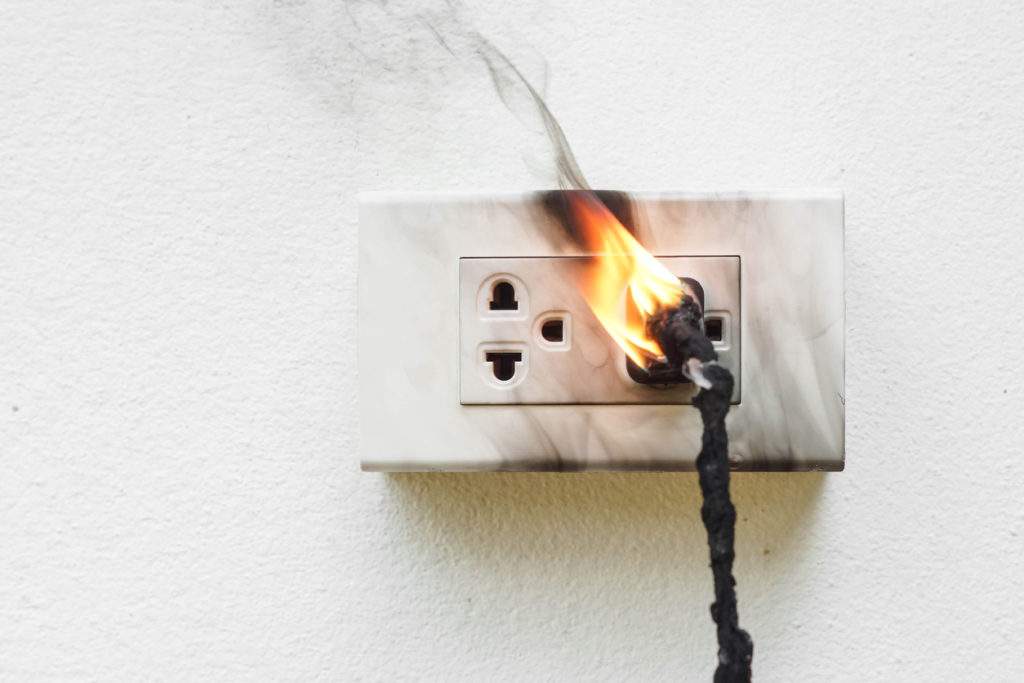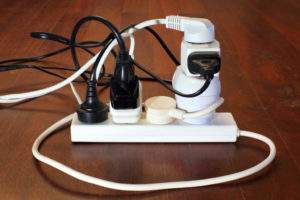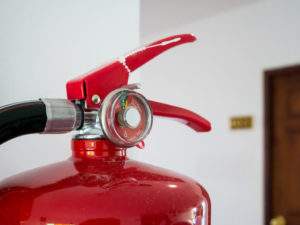How to Put Out an Electrical Fire

When a fire breaks out in your home, the natural first reaction is often to panic. You may freeze in your tracks, find yourself completely blanking on what you should do, or worse, spring into action and make a snap decision without the proper knowledge, actually making the situation even worse and more dangerous.
Electrical fires are especially dangerous because the things that cause them to spread or be suppressed are entirely different from fires caused by other sources. Because of this, it is essential that you know what to do with an electrical fire before the time comes for action.
Here, we outline the steps to take to put out an electrical fire. If you want to learn more about cleaning up after a fire, check out this video.
What is an Electrical Fire

Because the source of the fire is electricity, it inherently has different qualities than a fire fueled by another source, and it is important to follow specific steps, should you encounter this type of fire.
What NOT to Do
When it comes to electrical fires, what not to do is just as important, if not more important, than what you should do.
If you only remember one thing about electrical fires, remember this — DO NOT TRY TO USE WATER TO EXTINGUISH THE FIRE.
Water acts as a conductor for electricity, and not only will water not put out the fire, but it will make the fire worse. If a stream of water exists between you and the fire, you could be electrocuted, and anywhere the water spreads, the fire will, too.
If you are unsure whether a fire in your home is an electrical fire or comes from another source, play it safe and assume it could be an electrical fire. Water is extremely dangerous in these situations, and the wrong move could cost you not only your home, but your life.
What Puts Out an Electrical Fire
Now that you know the #1 thing NOT to do in an electrical fire, here are some other important things to know and steps to take.
1. If possible, unplug the source.
If you are using an appliance that catches on fire, and you can safely reach the cord to unplug the appliance, you should do so. One extremely important caveat here is that you should not do so if you have any water on your body (such as wet hands if you’re in the kitchen washing dishes), as water fuels an electrical fire, and could also cause electric shock or electrocution. However, if you can unplug it safely, you will be separating the fire from its fuel, and this can be essential to keep the fire from spreading.
2. Put the electrical fire out, if possible.
Small electrical fires can be put out in a variety of ways.
Baking soda is one great option, particularly if you have some on hand in your kitchen. Smother the flame with baking soda until it has completely extinguished.
It may also be possible to put the fire out by removing the oxygen source by smothering it with a heavy blanket or other heavy clothing. Again, this should only be used if the flame is small and the material you’re covering it with will separate the flame from its oxygen source, rather than just provide additional kindling.
The third option is the most ideal, and that is using a fire extinguisher rated for electrical fires to put out the fire. Electrical fires are known as a Class C fire, and necessitate either a fire extinguisher specifically designated for Class C use, or a multi-purpose fire extinguisher, labeled “ABC.”
This is a smart thing to know in advance, so you don’t find yourself scrambling to read your fire extinguisher in a moment of panic. Keep a multi-purpose fire extinguisher in your kitchen so that you know you will be able to use it, regardless of the source of the flame.
3. Get out of the house if you cannot put out the electrical fire!
As soon as you see that the fire is spreading and recognize that you cannot safely put it out on your own, get out of your house right away. Small electrical fires can often be put out, so taking those first few moments to assess and attempt to put the fire out yourself can help to minimize damage, but use your common sense and get out before things become dangerous for you and your family.
Close the door when you leave your home, to contain the fire. Call 911 as soon as you and your family are safely away from your home.

Keep a multi-use fire extinguisher handy in your kitchen, as well as throughout your home, and educate the other members of your family about the dangers of electrical fires. If you want to see whether your home is operating as safely as possible, bring in an electrician to assess things. They can provide recommendations if additional protection against electrical fires could be useful in your case.
If you have experienced an electrical fire and need help getting your home back to pre-loss condition, Abbotts is here to help. Contact us today for a free consultation.
